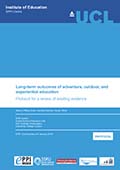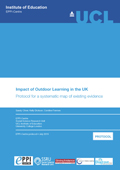The following work is being undertaken within education in the EPPI Centre.
Long-term outcomes of adventure, outdoor, and experiential education: Protocol for a review of existing evidence (2016)

What do we want to know?
This review aims to identify key short-term outcomes for at risk or disengaged young people that, if changed by an adventure programme intervention, have been demonstrated to be associated with longer-term outcomes such as attendance and/or attainment in education, employability, and mental health.
The review questions are:
- Which outcomes show maintenance of adventure programme effects or increases in effects over time?
- Are any short-term outcomes linked to different outcomes at later measurement points?
Who wants to know and why?
The Association of Sail Training Organisations (ASTO) and Sail Training International (STI) are aware of anecdotal evidence for the benefit of Sail Training for young people, but acknowledge that there is very little research which provides strong scientific evidence of its effect, particularly in the long term. Reasons for this might be the cost involved in measuring and evaluating an intervention long after it has finished, or the difficulty in getting responses from participants who might be hard to reach. Measuring short-term outcomes - i.e., immediately after the completion of the intervention - is more practical, but does not tell us about the maintenance or changes in intervention effects further in the future.
ASTO and STI have commissioned this review of the existing literature to identify short-term outcomes that are linked to long-term outcomes after the completion of an adventure programme. This review is also relevant to managers and instructors of adventure programmes; people who fund or commission such programmes; youth services; young people; and parents.
How shall we work?
We will conduct a rapid review of evaluations of adventure programme interventions for at risk and disengaged young people that report both short and long-term outcomes.
This protocol should be cited as:
O'Mara-Eves A, Fiennes C, Oliver S (2016) Long-term outcomes of adventure, outdoor, and experiential education: Protocol for a review of existing evidence. Protocol. London: EPPI Centre, Social Science Research Unit, Institute of Education, University College London.
Impact of Outdoor Learning in the UK: protocol for a systematic map of existing evidence (2015)

What do we want to know?
This review will investigate what is known from research about outdoor learning, whether this is: children’s experiences with nature; creative learning environments, including outside the classroom; school and university students learning outside the classroom; adventure holidays; or other approaches to learning and personal development out of doors.
The review questions are:
- What is the nature of the existing research that addresses outdoor learning that aims to meet children and young people’s educational, developmental or therapeutic needs?
- To what extent does the existing research match current practice in the UK?
Who wants to know and why?
These questions were asked by the Blagrave Trust (http://www.blagravetrust.org/), a family foundation which supports disadvantaged young people in southern England and is funding this work. The Blagrave Trust worked with the Outdoor Learning Institute (http://www.outdoor-learning.org/) to commission the work.
This review is also relevant to managers and instructors of outdoor learning programmes, and school teachers, students and parents.
How shall we work?
A systematic search of academic bibliographic databases will be complemented by crowd-sourcing studies through networks of outdoor learning organisations. The strength of the evidence will be assessed in terms of the standards of evidence recognised by the ORACLE project (http://project-oracle.com/news-and-events/blog-standards-of-evidence-all-talk-no-action/).
This report should be cited as:
Oliver S, Dickson K, Fiennes C (2015) Impact of Outdoor Learning in the UK: protocol for a systematic map of existing evidence. London: EPPI Centre, Social Science Research Unit, UCL Institute of Education.